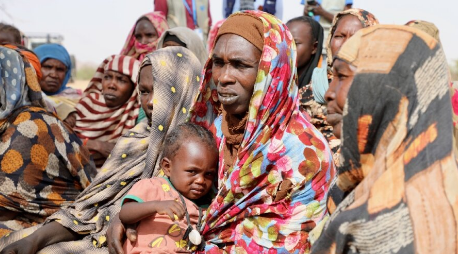Several Sudanese women refugees in camps in eastern Chad have complained about the poor and dire living conditions.
A women’s rights activist, Sarah Adam, told Radio Tamazuj, that the women who fled the ongoing war in Sudan from various regions of Darfur are suffering immensely in the refugee camps of eastern Chad.
She pointed out the poor health conditions in the camps and the difficulties in childbirth due to the lack of adequate medical staff. Additionally, she highlighted the scarcity of supplies provided by humanitarian organizations.
She also shed light on the increasing unemployment rate among men, with many relying entirely on women’s work in markets, households, bricklaying, and other low-income activities to meet their daily needs.
“The situation is becoming inhumane with the onset of the holy month of Ramadan, which requires good health and energy to continue fasting and performing religious duties,” Adam said.
She appealed to all benefactors and humanitarian organizations to stand with women to ensure that the holy month passes without loss of life.
Zakia Abbakar, who sought refuge in Alashi Refugee Camp, highlighted the deteriorating economic situation and the cessation of supplies by humanitarian organizations, which has exacerbated suffering and led to the spread of malnutrition among the elderly and children, which she described as “horrific” during the holy month of Ramadan.
“The entire camp faces the challenge of water scarcity, forcing women to venture out and travel long distances daily in search of water,” she lamented, adding that this exposes them to risks and violent acts by unknown assailants.
Similarly, Halima Ahmed, a refugee in the Mangi camp, said, her family often goes for several days without a meal.
“I spend several days with my young children without food and water, causing my children to cry all day,” she grieved. “What I fear most is that my children will die before my eyes while I stand helpless without being able to do anything.”
Relatedly, the World Food Programme (WFP) warned that it may be forced to stop assisting more than a million Sudanese refugees in Chad due to funding shortages.
On Wednesday, the director of WFP in Chad, Pierre Orant, stated that they have already reduced their operations in a manner that was unimaginable even a few years ago.
He further added that their funding is running out, warning that the situation could lead to a famine.




